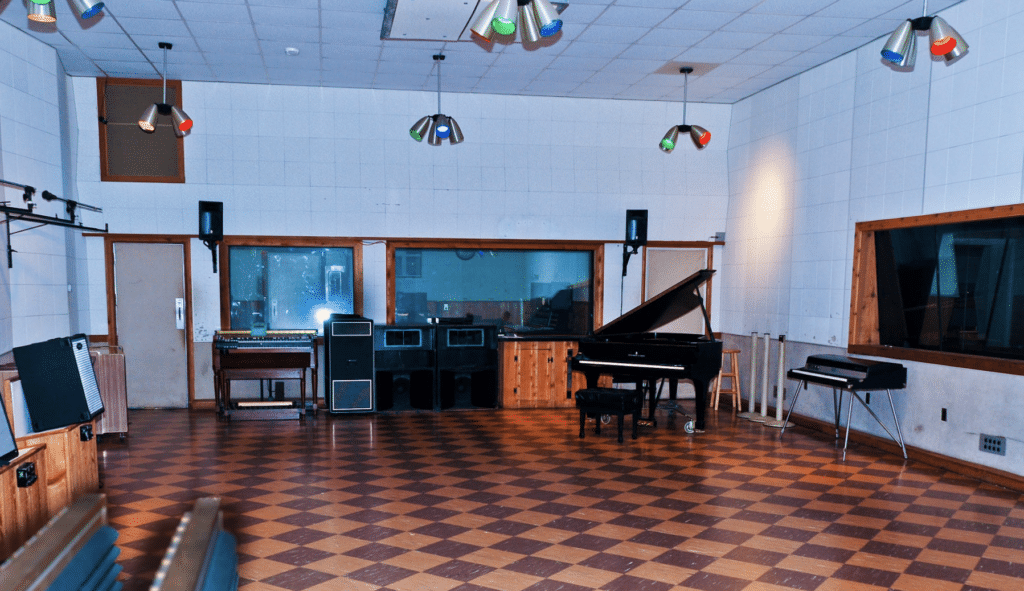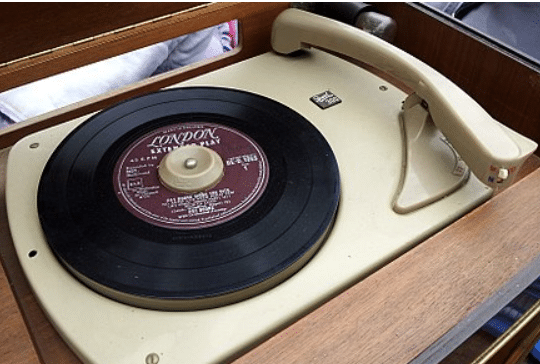Introduction
This article outlines some thoughts on Gutenberg that I’ve mulling on for a few months.
I’ve been thinking about how the tools we use to produce content have an impact on the nature of the content we produce.
I realize that some of these ideas might seem far-fetched, so be kind, and let me know what you think in the comments 🙂
Nashville WordCamp US 2018 – Gutenberg is born to the World!
In 2018 I watched as Matt Mullenweg unveiled the Gutenberg Block Editor at the US WordCamp.
It was a great conference but the most profound learning for me weren’t the presentations.
The lightbulb moment for me was a tour of the world-famous recording RCA Studio B in Nashville.

RCA Studio B is the place where Elvis recorded some of his biggest-selling records.
And as we toured Studio B, I noticed some 45 rpm records hanging on the wall.
Our tour guide explained how the 45rpm record changed the entire music industry.
The reason?
The 45rpm record was cheaper and more portable.
And it could only hold a few minutes of music on each side.
The 45rpm had inbuilt limitations, and these limitations had a direct effect on music.

As a result, popular music had to become shorter in length to fit the medium.
And this changed music and the pop music industry forever.
When it arrived 70 years ago today, the 45 rpm single, a format that would revolutionize pop music, seemed less radical than simply confusing.
On March 15th, 1949, RCA Victor became the first label to roll out records that were smaller (seven inches in diameter) and held less music (only a few minutes a side) than the in-vogue 78s.
It’s impossible to underestimate the impact of the 45, which was the iTunes 99-cent download or surprise single (à la the Black Keys’ sudden “Lo/Hi”) of its day.
That’s a profound and unintended impact.
Continuing the music analogy, let’s look at the birth of the electric guitar.
The electric guitar solved a particular problem.
Invented in 1932, the electric guitar was adopted by jazz guitar players, who wanted to be heard when playing single-note guitar solos in large big band ensembles.
Wikipedia
But the invention of the electric guitar also led to all kinds of new types of music that weren’t imagined in 1932.

One example is rock music.
Without electric guitars, there would be no rock music industry.
And imagine music without the Rolling Stones.
Imagine music without the Beatles, Nirvana, or Pink Floyd.
Enter the Gutenberg Block Editor
My contention is that the same thing will happen with the Gutenberg Block Editor.
The Block Editor is a new content-producing tool.
And like the electric guitar, it will change the nature of the content that we make with it.
Let me explain.
At the moment we are using Gutenberg to create WordPress pages and posts.
And soon we will use Gutenberg to build our entire website.
This is is an important, disruptive and profound change.
But for me, the most interesting aspect of Gutenberg isn’t how it’s going to change how we build websites.
I don’t want to downplay the importance of this change, but there’s a bigger change that no one is talking about yet.
Gutenberg has introduced a brand new content model.
This content model is blocks.
And in one stroke Gutenberg has atomized content.
We have no idea yet what impact this atomization of content will have on the content we produce.
Just like in 1932 when no one could have predicted the impact of the electric guitar, so today, no one can predict the impact of blocks on the web or the content we will produce with this new tool.
Conclusion
Gutenberg is the web’s new de-facto content-producing tool.
And it’s going to change the nature of the content we produce.
But what that content will look like is anyone’s guess.
It’s going to be exciting to see who takes this new tool in new directions that we haven’t even thought of yet.
And it’s going to be especially exciting to watch who’s going to be the next, Dylan, Beatles or Rolling Stones.